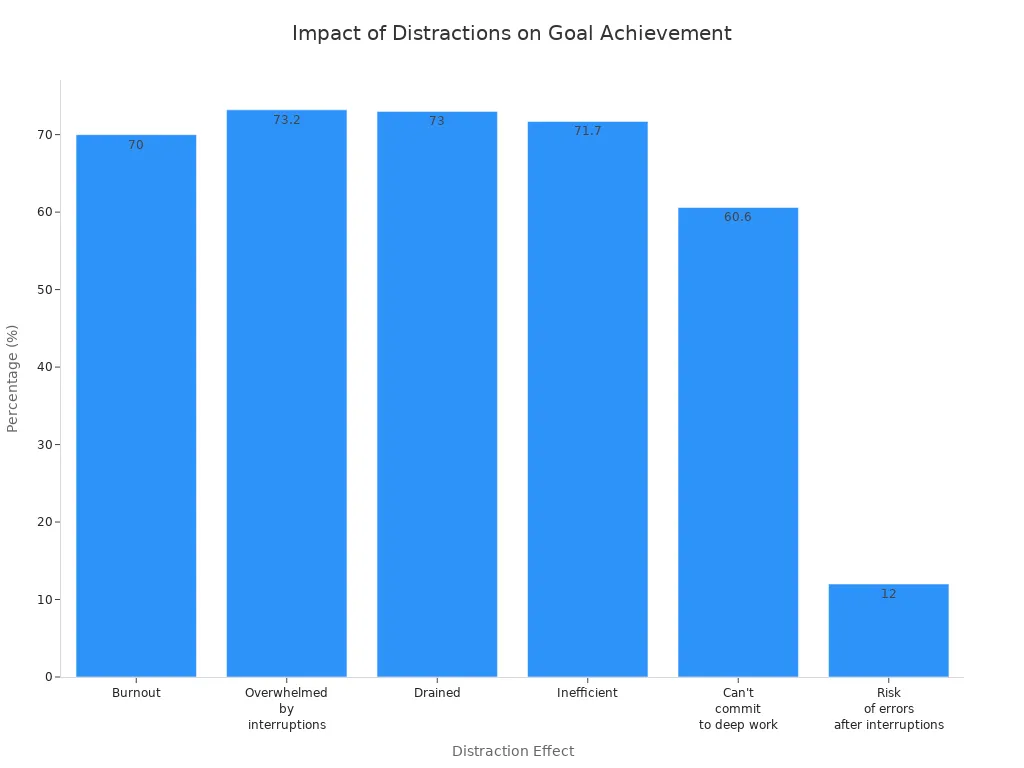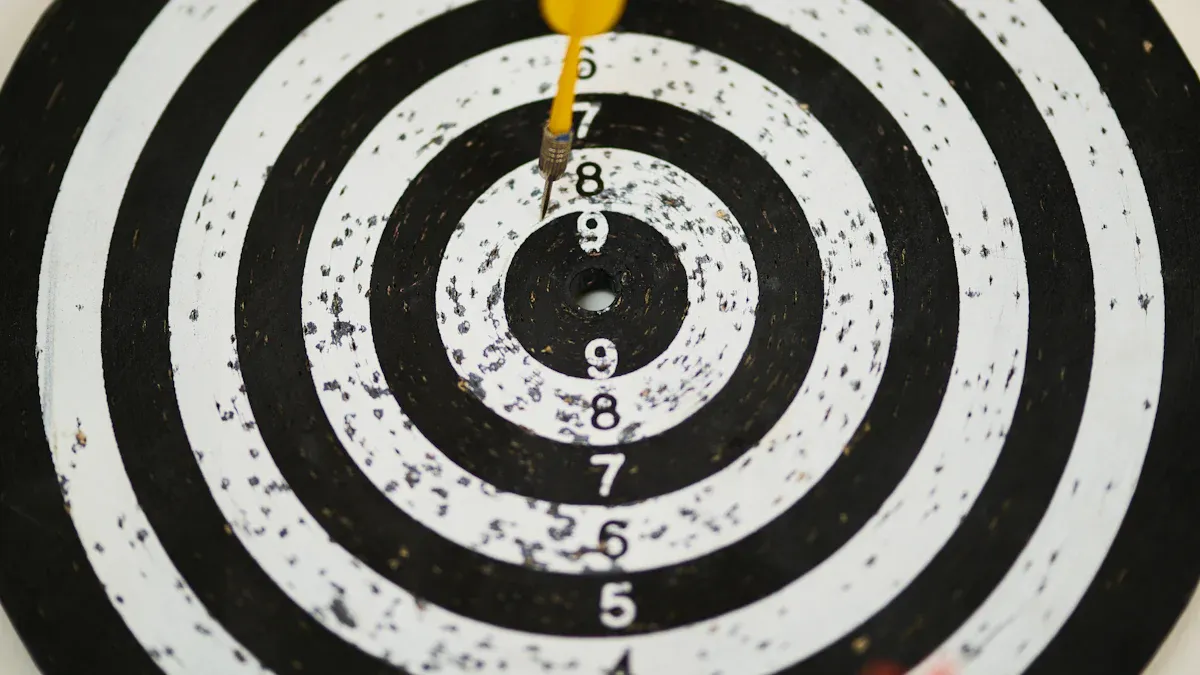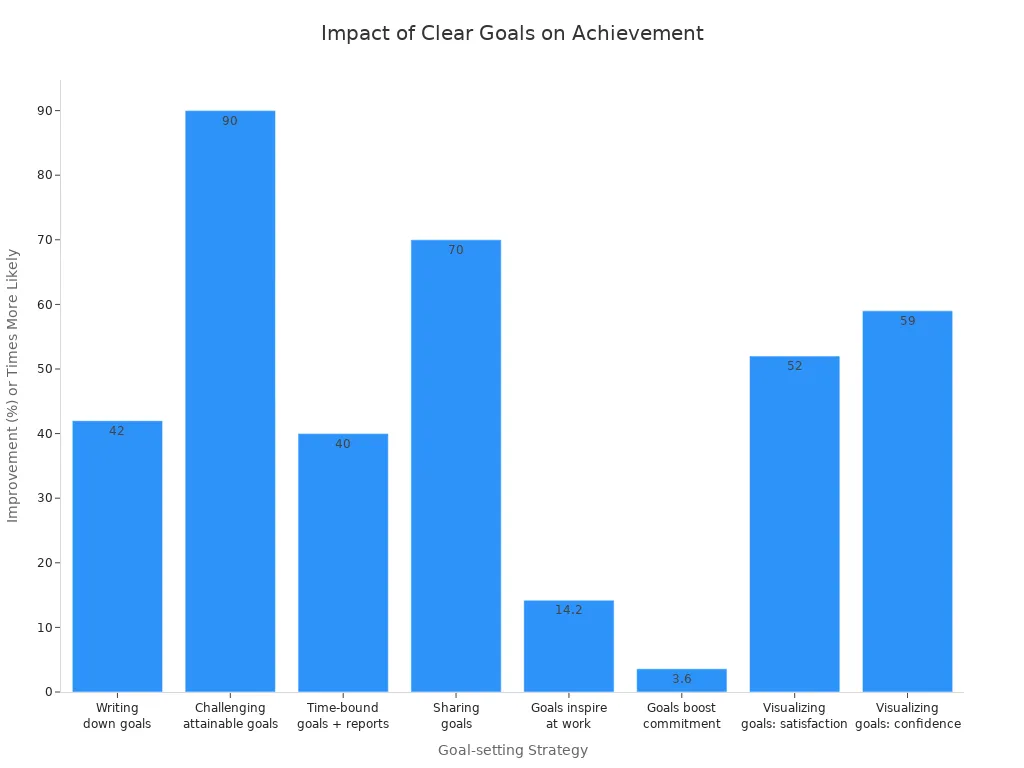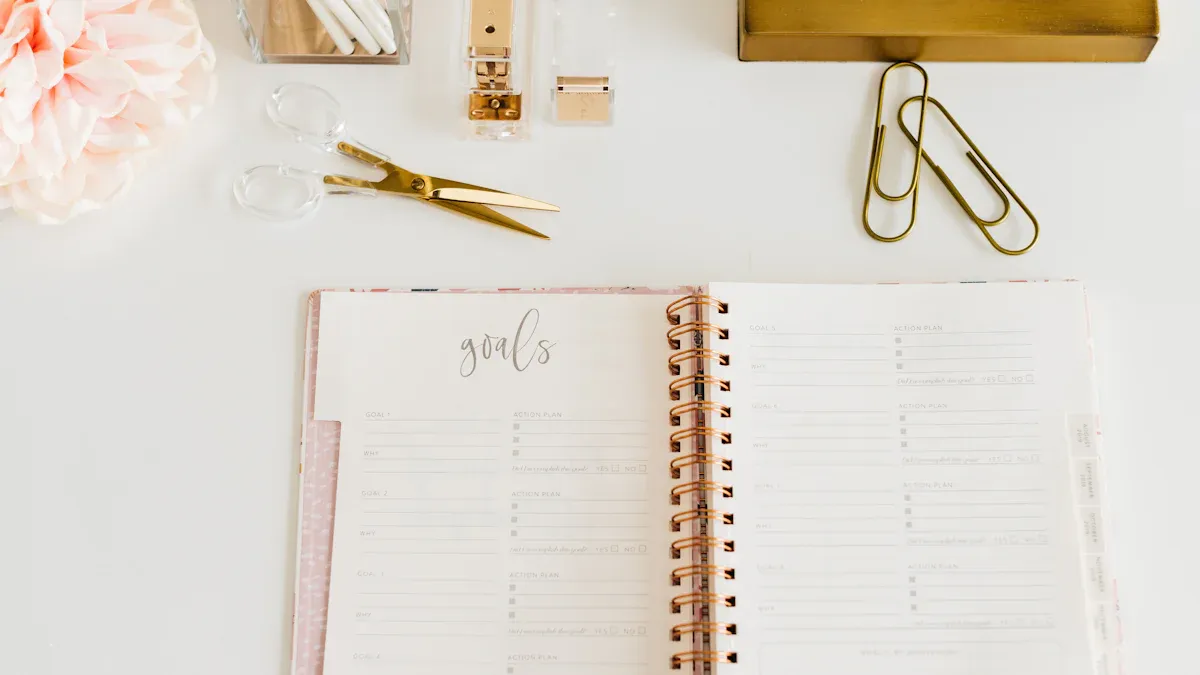10 Easy Ways to Stay Consistent with Your Goals in 2025
Do you struggle to keep up with your goals? You’re not alone. Everyone faces setbacks. You need simple solutions that actually work. > You can find easy ways to stay consistent with your goals, even when life gets busy. Anyone can build good habits. Start fresh today.
Key Takeaways
- Set clear and specific goals to stay focused and motivated. Write them down to increase your chances of success by 42%.
- Break down big goals into smaller, manageable steps. This makes progress easier to see and helps you stay on track.
- Build a routine with daily habits and reminders. Consistency in your actions leads to automatic progress toward your goals.
Why Consistency Is Tough
Common Challenges
It can be hard to keep working on your goals. Many people feel this way. You might feel bad or think negative things about yourself. Sometimes your goals are not clear, so you get confused. Trying to please others or be perfect can make you feel stuck. You may stop caring when things get boring or you do not see results. Working too much without breaks can make you feel tired.
Here are some reasons it is hard to stay consistent:
- Feeling bad or thinking negative things
- Goals that are not clear and hard to focus on
- Pressure from others or wanting to be perfect
- Losing interest because things are boring or slow
- Feeling tired from working too much without breaks
You are not the only one with these problems. Many people look for easy ways to keep working on their goals because everyone faces these issues.
Daily Distractions
Distractions can make it hard to focus every day. You might get stopped by messages, loud sounds, or your own thoughts. These things happen a lot. Most workers feel stressed by all the interruptions. Many people feel tired or like they cannot work well.
Check out these facts:
| Statistic | Percentage |
|---|---|
| Workers who feel tired from burnout | 70% |
| Workers who feel stressed by interruptions | 73.2% |
| Workers who feel tired | 73% |
| Workers who feel they cannot work well | 71.7% |
| Workers who cannot focus without distractions | 60.6% |
| More mistakes after interruptions | 12% |

You might lose about 2 hours each day because of distractions. Most people lose 25% of their work time, but people with ADHD lose 51%. These facts show how distractions can make it hard to reach your goals.
Easy Ways to Stay Consistent with Your Goals
You want to get better at your goals. Sometimes you need some help. Here are 10 easy ways to keep working on your goals. These tips can help anyone. You can use them if you are new or if you had trouble before. Each tip is simple. You can try them right now.
- Set clear goals
- Break down goals
- Build a routine
- Prioritize tasks
- Monitor progress
- Stay accountable
- Make it enjoyable
- Practice patience
- Connect emotionally
- Adjust as needed
You do not need fancy tools or a perfect plan. You just need easy ways to keep working on your goals. Small steps can make big changes.
Many people find it helps to break big goals into smaller ones. Timelines and simple methods like the PACT Method also help. These ideas make it easier to stick to your plans. Here are some useful strategies:
| Strategy | Description |
|---|---|
| Break down goals | Split big goals into small tasks with timelines. This helps you stay motivated and not put things off. |
| PACT Method | Focus on Purposeful, Actionable, Continuous, and Trackable steps. This works well for long-term goals. |
| Establish timelines | Set milestones and deadlines to check your progress. For example, you can work on fitness in a set time. |
You will learn more about these easy ways below. No matter where you start, you can use these ideas to keep moving forward.
Set Clear Goals

Setting clear goals gives you a strong start. You know exactly what you want, and you can see your progress. When you set clear goals, you make it easier to stay on track and feel motivated.
Be Specific
Vague goals can leave you feeling lost. If you say, “I want to get fit,” you might not know where to begin. Instead, try something like, “I will walk 30 minutes every day.” Specific goals help you focus and take action.
Tip: Break your goal into small, clear steps. This makes it less scary and much easier to start.
Research shows that people who set challenging but realistic goals perform better. In fact, 90% of people improve their performance when they set clear goals. You can see how different strategies boost your chances in the chart below.

Write Them Down
Writing your goals makes them real. You can look at them every day and remind yourself what you want. Studies found that writing down your goals increases your chances of success by 42%. That’s a big jump!
Here are some benefits you get when you write down specific goals:
| Benefit | Description |
|---|---|
| Improved performance | You focus your energy and do things better. |
| Improved focus and persistence | You keep your eyes on the prize and don’t give up easily. |
| More intrinsic motivation | You feel good working toward your goals. |
| Increased autonomy | You feel in control of your life. |
| Heightened task enjoyment | You enjoy what you do more. |
| Higher satisfaction | You feel happier with your progress. |
If you want easy ways to stay consistent with your goals, start by making them clear and writing them down. You’ll feel more confident and ready to take action.
Break Down Goals
Small Steps
Big goals can feel overwhelming. You might look at a huge project and wonder where to start. The trick is to break it down into small, simple steps. When you set clear milestones, you make progress easier to see. Research shows that tasks with well-defined milestones get finished 75% more often than those without clear goals. If you want to write a book, you could set a milestone like “write the first chapter by Friday.” This keeps you motivated and helps you stay on track.
A study with over 9,000 people found that setting smaller, frequent targets—like working four hours each week—makes it much easier to reach big goals, such as a 200-hour yearly commitment. Framing subgoals gives you a sense of direction and helps you keep moving forward. You can use this strategy for any goal, whether it’s fitness, learning, or saving money.
Tip: Write down each small step and check it off when you finish. You’ll feel good every time you complete one.
Track Progress
Tracking your progress helps you see how far you’ve come. You get to celebrate your wins, spot areas that need work, and make changes if you need to. Here’s how tracking helps:
- You celebrate your successes 🎉
- You notice what needs improvement
- You review and adjust your plan
When you keep track, you stay motivated and focused. You can use a notebook, an app, or even a simple chart. These easy ways to stay consistent with your goals work best when you know exactly where you stand.
Build a Routine
Building a routine helps you stay on track with your goals. When you follow the same steps each day, you make progress feel automatic. You do not have to think about what comes next. You just do it.
Daily Habits
You can start by adding small habits to your day. These habits do not need to be big. Try drinking a glass of water when you wake up or writing down one thing you want to finish. When you repeat these actions, your brain starts to remember them. Over time, these habits become part of your routine.
Here’s how daily habits connect to reaching your goals:
| Evidence | Explanation |
|---|---|
| Consistency in daily habits | Doing small habits every day for 21 days helps you form automatic behaviors. |
| Role of dopamine | Dopamine helps you feel good about your actions and keeps you motivated to stick with them. |
| Neural mechanisms | Your brain uses special parts to plan and repeat actions, making habits and goals work together. |
Researchers found that when you do goal-friendly actions often, your habits get stronger in just three months. People who stick to their routines see the best results. Tracking your progress also helps you reach your goals.
Tip: Start with one habit. Add more as you get comfortable.
Use Reminders
Reminders help you remember what you want to do. You can set alarms on your phone, use sticky notes, or ask a friend to check in. Reminders work best when you see or hear them often.
Studies show that reminders, like text messages, help people reach their goals. Reminders work even better when you repeat them. They help you remember, even if you sometimes forget. Reminders also help people who have trouble remembering things. They make it easier to keep up with new habits.
If you want easy ways to stay consistent with your goals, build a routine with daily habits and reminders. You will find it much easier to keep moving forward.
Prioritize Tasks
Focus on What Matters
You have a lot to do every day. Not every task helps you reach your goals. When you focus on what matters most, you make real progress. Try starting your day by writing down the top three things you want to finish. This keeps your mind clear and your actions on track.
“I have a list of priorities that I make for myself. Every day when I get to the office, I write down the top three or four things that I have to really focus on. This way, I know what I want to achieve that day.”
You can use different methods to help you decide what is most important. Here are some popular ways:
| Method | Description |
|---|---|
| Eisenhower matrix | Sorts tasks by urgency and importance. Helps you spot what is critical and what is just busywork. |
| Pareto principle (80/20 rule) | Focuses on the 20% of tasks that give you 80% of your results. |
| MoSCoW method | Puts tasks into must-haves, should-haves, could-haves, and won’t-haves. |
| Value vs. effort matrix | Looks at how much value a task brings compared to the effort it takes. |
When you focus on high-impact tasks, you get more done. You can also delegate or skip less important jobs. This helps you use your time wisely and see real results.
- Align your daily actions with your most important goals
- Avoid distractions from less important tasks
- Make smart choices about how you spend your time
Limit Distractions
Distractions can pull you away from your goals. You can take steps to keep your focus strong. Try these strategies:
| Strategy | Description |
|---|---|
| Practice time management | Use tools like the quadrant system to plan your day and stick to your goals. |
| Use the Pomodoro Technique | Work for 25 minutes, then take a 5-minute break. This keeps your mind fresh and focused. |
| Limit distractions from phones | Use apps to block websites and silence notifications. |
Taking regular breaks helps your brain recharge. You stay sharp and avoid burnout. Try setting aside a few minutes each day for mindfulness. Focus on one task at a time. Breathe deeply and pay attention to what you are doing.
- Set aside 5-10 minutes for mindfulness
- Practice focusing on one thing
- Use mindful breathing to boost your attention
When you limit distractions, you make it easier to stay consistent with your goals. You will notice better focus and more progress every day.
Monitor Progress

Celebrate Wins
You work hard every day to reach your goals. Sometimes, you forget to notice the small victories along the way. Celebrating wins, even tiny ones, can boost your mood and help you stay motivated. When you recognize your progress, you feel more confident and ready to tackle bigger challenges.
- 🎉 Small wins release dopamine, which makes you feel good and builds resilience.
- Every achievement creates momentum and keeps you engaged.
- Noticing daily accomplishments helps you form good habits and stick with your goals.
- Acknowledging progress during setbacks helps you stay focused and bounce back.
Tip: Write down your wins in a notebook or share them with a friend. You will see how far you have come and feel proud of your journey.
Celebrating progress activates your brain’s reward system. You start to enjoy working toward your goals, even when things get tough. This positive feeling helps you keep moving forward.
Adjust as Needed
You might notice that your plan does not always work perfectly. That is normal. Adjusting your goals and strategies helps you stay on track. When you review your progress, you can see what works and what needs to change.
- Write down your goals and create an action plan.
- Share updates with a friend or accountability partner.
- Review your results and make changes if needed.
A study found that people who wrote down their goals and gave weekly updates had a 76% success rate. That is much higher than those who did not write down their goals. When you adjust your plan, you give yourself a better chance to succeed.
Remember, your goals can change as you grow. Stay flexible and keep moving forward.
Stay Accountable
Accountability Partner
You do not have to chase your goals alone. An accountability partner can make a huge difference. When you share your plans with someone, you feel more motivated to keep going. You check in with each other, talk about your progress, and help each other stay on track. This support can push you to work harder and not give up.
Here are some ways an accountability partner helps you reach your goals:
- You get more motivation and support.
- You feel responsible for your actions.
- You work faster and with more focus.
- You are twice as likely to reach health-related goals compared to working alone.
Tip: Pick someone who cares about your success. You can text, call, or meet up to talk about your goals. Celebrate wins together and help each other through tough days.
Join a Group
Groups can help you stay consistent with your goals. When you join a group, you share your journey with others who want to succeed. You feel part of something bigger. You learn from each other, cheer each other on, and build strong habits together.
Check out how group settings boost your progress:
| Evidence Type | Findings |
|---|---|
| Goal Setting | Group-focused goals increase motivation and make everyone work better together. |
| Group Dynamics | Setting goals as a group builds commitment and trust. |
| Performance Impact | People who match their personal goals with group goals perform better than those who do not. |
You can join a club, online community, or even a small team at school or work. When you share your goals, you get more encouragement and stay on track. Working with others makes reaching your goals easier and more fun.
Make It Enjoyable
Add Fun
You can make your goals easier to stick with when you add fun to your routine. If you pair your goal with something you enjoy, you feel more excited to keep going. This idea is called temptation bundling. For example, you might listen to your favorite podcast while you exercise or watch a show during chores. You turn a boring task into something you look forward to.
- Pairing a goal with an enjoyable activity boosts motivation and consistency.
- People who listened to audiobooks at the gym visited more often, according to a study by Milkman and colleagues.
A huge study from Harvard, Stanford, and MIT found that when you enjoy your leisure time, you make better choices about how you spend your time later. If you have fun with your routines, you are more likely to stick with your goals for the long run. Fun helps you build habits that last.
Tip: Try adding music, games, or friendly competition to your goal activities. You will notice that you want to keep going.
Reward Yourself
Rewards help you stay motivated and make your goals feel more satisfying. You can use both external and internal rewards to boost your progress. When you celebrate your wins, you feel proud and want to keep working toward your goals.
| Source of Motivation | Description | Effect on Motivation |
|---|---|---|
| External Rewards | You work for something you can see or get, like a treat or a prize. | Motivation goes up when the reward is valuable. |
| Internal Rewards | You feel good inside when you reach a goal, like pride or happiness. | Motivation grows through enjoyment and engagement. |
| Positive Self-Concept | You remember your success and feel confident about your actions. | Motivation links to how you see yourself. |
Research shows that rewards help your brain learn and act faster. Dopamine makes you feel good and helps you pick the right actions. When you get positive feedback, you want to repeat your success. You can use small rewards, like a favorite snack or a break, to celebrate each step. This keeps you moving forward and makes your goals more enjoyable.
- Winning feedback boosts motivation and performance.
- Approach-motivated states make you more likely to reach your goals.
- You feel happier and more focused when you reward yourself.
Practice Patience
Staying consistent with your goals takes time. You will face tough days, slow progress, and moments when you want to quit. Patience helps you keep going, even when things do not go as planned. When you practice patience, you build strength for the long run.
Embrace Setbacks
Setbacks happen to everyone. You might miss a workout, forget a task, or make a mistake. Instead of feeling bad, try to see setbacks as part of your journey. When you look at what went wrong, you can find new ways to move forward.
- When you analyze failures, you learn how to solve problems better next time.
- Being flexible helps you adjust your plans and keep working toward your goals.
- Every setback can become a step toward personal growth and future success.
Many people give up after a setback, but you do not have to. Mistakes teach you what does not work. Each error gives you a chance to learn more about yourself and your goals. If you keep going, you will get stronger and more confident.
Remember, even gym trainers face setbacks. The key is to keep trying and adjust your plan when needed.
Self-Forgiveness
You will make mistakes as you try to stay consistent with your goals. Forgiving yourself helps you bounce back faster. When you let go of guilt, you feel better and can focus on what matters.
| Key Findings | Description |
|---|---|
| Self-forgiveness and well-being | Forgiving yourself leads to better well-being and helps you stay resilient. |
| Unforgiveness and conflict | Holding onto guilt can cause stress and make it harder to stay consistent with your goals. |
| Age moderation | Self-forgiveness helps everyone, but its effect may change as you get older. |
Give yourself permission to start fresh after a mistake. You will find it easier to stay consistent with your goals and enjoy the journey.
Connect Emotionally
Know Your Why
You need a good reason to stick with your goals. When you know why you want something, you feel more excited to keep trying. Even when things get hard, your “why” gives you strength. It helps you see problems as ways to learn. If you set a goal for someone else, you might quit when it gets tough. But if your goal is important to you, you will keep going.
See how motivation affects how long you keep trying:
| Motivation Type | Persistence Level | Coping Strategy | Perception of Challenges |
|---|---|---|---|
| Autonomous Motivation | Higher | Task-focused coping | Viewed as opportunities |
| Controlled Motivation | Lower | Disengagement-based coping | Viewed as threats |
When you care about your goals, you trust yourself more. You feel proud of what you do. You also talk better with others about your journey. Small things, like remembering your purpose, help you stick with your goals every day.
Visualize Success
Imagine yourself reaching your goals. Visualization is a strong tool that helps you stay on track. When you picture success, your brain acts like you are really doing it. This makes you feel brave and ready to start.
- Visualization helps you feel excited and focus on your goals.
- It makes your goals seem real and keeps them in your mind.
- You learn faster and feel less worried when you picture yourself winning.
Try closing your eyes and seeing yourself finish something big. Do this often. You will find it easier to take action and stick with your goals. Remember, caring about your goals and picturing success can help you reach your dreams.
You do not need to do everything at once. Small, consistent actions help you stay consistent with your goals and build real change.
- These steps make your habits automatic over time.
- Starting small leads to big results, just like experts say.
Setbacks happen. Try one or two tips today and keep moving forward!
FAQ
How do I stay consistent with my goals when I feel lazy?
Try starting with one small step. You can set a reminder or ask a friend to check in. Celebrate every win, even tiny ones.
What if I miss a day or make a mistake?
You can forgive yourself and start again. Mistakes happen. Focus on your next action. Staying consistent with your goals means moving forward, not being perfect.
Can I use apps to help me stay consistent with my goals?
Yes! You can use habit trackers, calendar apps, or reminder tools. These apps help you see progress and keep you motivated every day. 📱


Post Comment